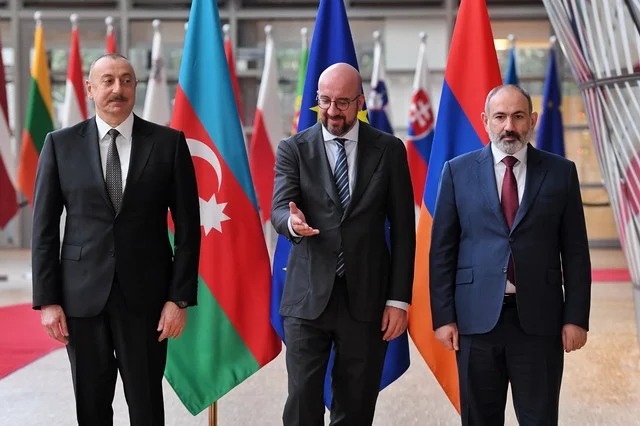Today, the opposition announces in the street that Pashinyan has no right to negotiate on behalf of Artsakh. Pro-government forces describe it as a provocation, an attempt to disrupt the peace process. But by making such statements, the opposition is only repeating what the Prime Minister himself has said many times, including in an interview with me on June 13, 2019. According to him, Aliyev represents the people of Azerbaijan, Pashinyan – the people of Armenia, and there should be someone who will represent the people of Artsakh in the talks. Judging by how EU President Charles Michel described the meeting between Pashinyan and Aliyev following the meeting in Brussels and the part related to the “peace treaty,” the Armenian leader negotiated on behalf of Artsakh, at the same time negotiating how to ensure the security of “ethnic Armenians” in Karabakh.
Apart from Michel’s statement, we have no official wording about those talks. (Yesterday, the Prime Minister’s address in the parliament was an attempt to avoid the issue). If the President of the EU Council gave his own wrong wording, the Prime Minister or the Foreign Minister can state that such a discussion did not take place, and Pashinyan raised the issue of Artsakh’s self-determination and the issue of its status in Brussels. Or he repeated what he said 3 years ago that he has no right to negotiate on behalf of Artsakh. (As a reference, when the mediator makes a statement related to the results of the negotiations, he shows the text of that statement to the negotiating parties in advance).
Another question needs to be clarified. Are the Brussels and Washington discussions synchronized with Russia, especially given the almost hostile relations between Russia and the West? If they are not synchronized, then our authorities are just embarking on a dangerous adventure. If they are synchronized, then why is the Russian Foreign Ministry making dissatisfied statements from Brussels? In any case, the chairs of the “demarcation” commissions Grigoryan and Mustafayev met on the Armenian-Azerbaijani border and agreed to hold the next meetings in Moscow and then in Brussels. I do not know how Moscow treats such “complementarism.” Let me remind you that Russian officials have hinted several times that they will not be able to cross the border without them, because they have the “real” maps of the Armenian and Azerbaijani SSR.
In my opinion, Russia and the West are interested in a scenario that is almost the same, which is very unfavorable for us (which I have already written about in two previous editorials). But there is competition among them as to who will implement that scenario.
Read also
Aram Abrahamyan





















































